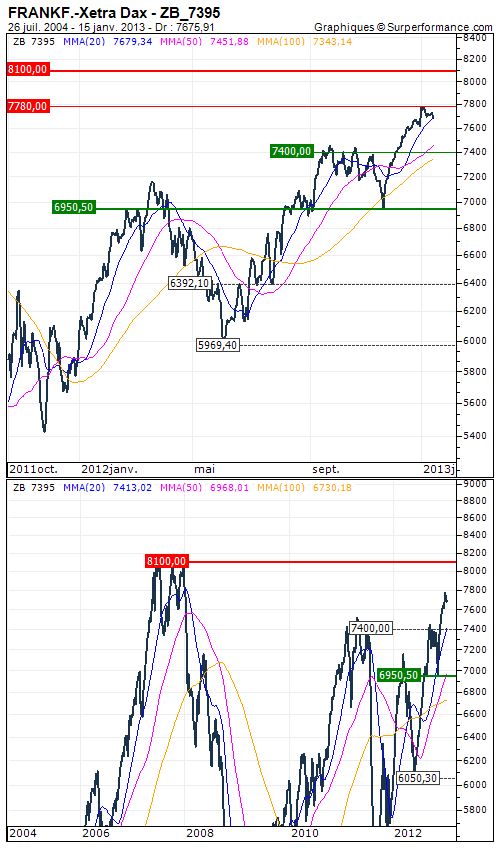DAX : Recent profit taking
By Rodolphe Steffan
The contraction in the fourth quarter of 2012 was larger than expected as gross domestic product fell 0.5%. As a result, investors were more cautious and took some profit while the benchmark index of the German stock exchange was testing a significant technical resistance area around 7750/7800 points. In addition to lower than expected growth over the whole year 2012 (0.7% against 0.8% expected), the decline in exports and industrial orders accentuate fears that the German economy was more affected by the European crisis than expected.
In addition, the trade surplus fell to 14.6 billion Euros against 14.9 billion in October. Analysts bet on a consensus of EUR 15 billion. The decline in imports make people doubt about the ability of German consumers and companies to sustain growth. In addition, the unemployment rate is rising and consumer confidence deteriorates. However, unemployment remains near its lowest level in 20 years and wages are rising for the first time in years. Similarly, the survey of purchasing managers showed that the private sector was growing in December for the first time in eight months and the IFO business climate improved in November and December.
However, financial operators and economists expect a further solid growth in 2013, saying that the current phase of weakness is only temporary. Even if the German government is preparing to cut its growth forecast for 2013 to 0.5%, according to the economic newspaper Handelsblatt, there are signs that the German economy would soon start moving forward again. Germany is a good student of the eurozone, although its growth is weak, public finances have largely cleaned up and the government has provided a balanced budget this year. Investors give a lot of credit to Germany. The country continues to finance at very low rates in bond markets. Arbitrages to German equities are quite logical in the euro area and optimism in the main sectors of the German economy is undeniable.
Technically, the dynamics of the DAX index remains bullish in weekly data above the area of 7400 points which also refers to the 20-week moving average. Consolidation at these levels could allow buyers to find opportunities and target a test of 8000 points. In the short term, we will wait until the exit of the daily trading range to take position. A break above 7800 pts will open the way for a resumption of the uptrend towards 8000/8100 points. On the downside, a break below 7600 pts militate for the on-going technical correction towards 7400 points. We can trade the exit of this range using the Dax future (code: DAXXXXX) on the futures market.


 DAX
DAX 






